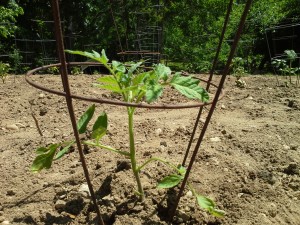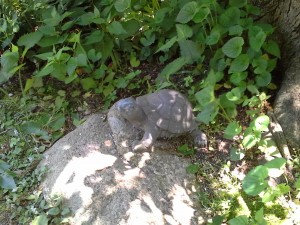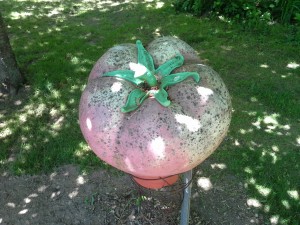We finally got around to planting our vegetable garden today, and I couldn’t help thinking again about the relationship between growing plants and growing children. My grandparents were farmers, and probably their parents were farmers. Growing up, my family always had a vegetable garden, and now I have my own. As I sat there in the warm dirt this morning, I felt the presence of all those ancestors who undoubtedly sat, just like me, in a plot of humid earth with a young seedling in hand.
No matter how much modern society likes to value change, many of the things we do are basically the same as the way things have been done for generations. Just like gardens and children. At Raising Harmony, we are committed to supporting the growth of young children and their families through shared music making. Here are some of the simple basics and the way music fits into growing:
Fertile soil:
Surround young children with healthy, adequate food and rich experiences. Play music that you love in the house in the car, and in the classroom; but also value quiet and silence. Turn off the sound every once in a while.
Nurture early:
Sing to babies, infants and toddlers. Early bonding is so tied up with how you sing or talk to little ones. All through history, grownups have used sing-song types of talking in beginning communication. The child is tuned into your voice, and that is the one that is most important.
Offer Lots of Sun and Lots of Water:
Once the plants begin to sprout, they depend on sun and water to continue growing. Toddlers and young children drink in early experiences and will soak up the meaning and memories. Concerts; music groups;, singing together with others; the marching band at the parade – all these musical moments enrich the child.
Weed:
Work to limit rocks and weeds. Watch out for pests. Listen carefully to the content of the songs that you play and ask yourself if the words or content of the lyrics are words you want kids to say or ideas you want kids to believe.
Give nature some time:
Plants blossom in their own time and efforts to rush their growing often ends up with lots of leaves and very little flowers or fruit. Music is a natural human experience that is also sometimes rushed and hurried in our society. Give children a chance to be musical and enjoy music just for the sake of being musical or enjoying music.
Harvest:
Vegetables and flowers often have a moment of perfect ripeness. That is the time to watch for and to be ready to pick. Learning music skills is the same. Join into music making with the child, and be ready for that instant when they can suddenly sing a whole melody, or play along with a beat. Enjoy together the juiciness of that special moment.
There is also a growing body of music therapy literature supporting early music as an important factor in development. While you watch your garden grow, you might want to check out some of these articles:
Bargiel, M. (2004). Lullabies and play songs: Theoretical considerations for an early attachment music therapy intervention through parental singing for developmentally at-risk infants. Voices: A World Forum for Music Therapy, 4(1).
de l’Etoile, S. K. (2006). Infant-directed singing: A theory for clinical intervention. Music Therapy Perspectives, 24(1), 22–29.
Oldfield, A., Bunce, L., & Adams, M. (2003). An investigation into short-term music therapy with mothers and young children. British Journal of Music Therapy, 17(1), 26–45.
Schwartz, E. K. (2009). In the beginning: Music therapy in early intervention groups. Imagine: Early Childhood Music Therapy Newsletter, 15. Silver Spring, MD: American Music Therapy Association.
Happy Growing!



